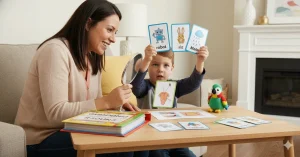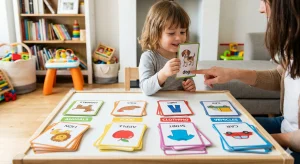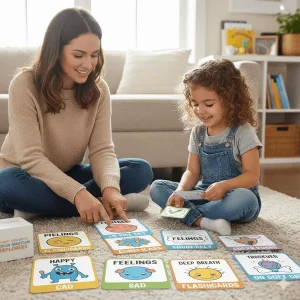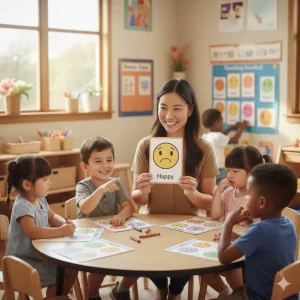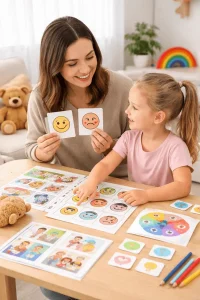Marriage Counseling: A Wise Move Before Filing for Divorce?
By Prapoorna M
Last Updated: July 8, 2024
Are you contemplating divorce and feeling uncertain about the next steps? You’re not alone. Many couples find themselves at a crossroads, unsure if ending their marriage is the right decision. This is where marriage counseling before divorce can play a crucial role.
Before making such a life-changing decision, it’s important to fully understand whether divorce is truly the best option for you and your partner. Marriage counseling offers a safe space to explore your relationship issues, improve communication, and determine the best path forward.
Book Your Marriage Counselling Now
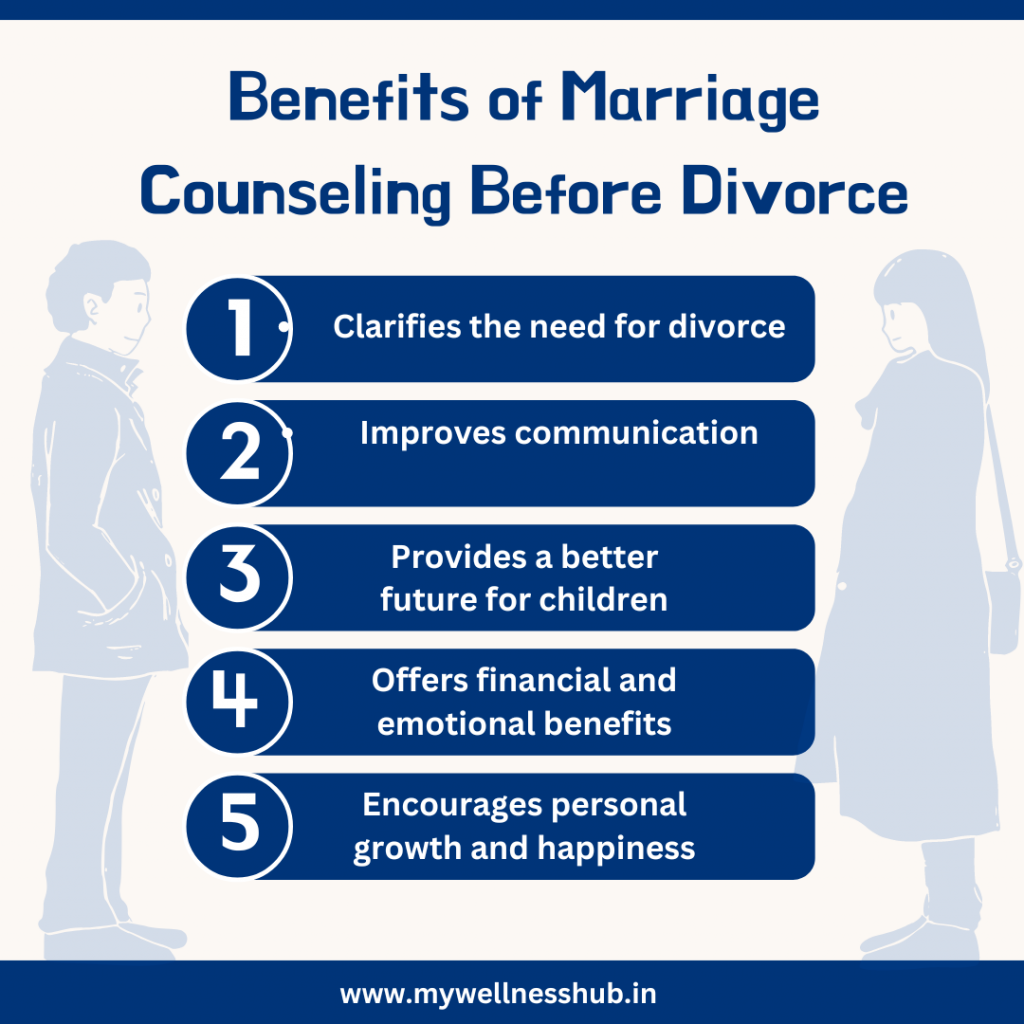
Understanding Marriage Counseling Before Divorce
When facing the difficult decision of whether to divorce, marriage counseling before divorce can be an invaluable step. But what exactly is marriage counseling, and how can it help?
Marriage counseling, also known as couples therapy, is a form of psychotherapy that focuses on improving the relationship between partners. A trained therapist helps couples navigate their issues, improve communication, and develop healthier ways of interacting. The goal is not always to save the marriage, but to help both partners understand their relationship better and make informed decisions about their future.
What Is Marriage Counseling?
Marriage counseling before divorce involves working with a licensed therapist who specializes in relationship issues. The therapist provides a neutral ground where both partners can express their feelings, thoughts, and concerns openly. Through guided conversations and exercises, the therapist helps the couple identify underlying problems and work towards solutions.
Marriage counseling can address a variety of issues such as:
- Communication problems
- Trust issues and infidelity
- Financial disagreements
- Parenting conflicts
- Emotional distance and lack of intimacy
Common Scenarios for Pre-Divorce Counseling
Couples may seek pre-divorce counseling for many reasons. Here are some common scenarios where it can be particularly beneficial:
- Ambivalence About Divorce: One or both partners are unsure if divorce is the right step and need clarity.
- Recurrent Conflicts: The couple experiences frequent arguments and cannot resolve their differences on their own.
- Desire to Save the Marriage: Both partners want to try to save their marriage but need professional guidance to address deep-seated issues.
- Co-Parenting Concerns: The couple wants to ensure they can co-parent effectively, even if they decide to divorce.
- Emotional Healing: One or both partners need help processing their emotions and finding closure, regardless of the outcome.
Also read: Relationship Counselling or Couple’s therapy: Know everything
Why Seek Marriage Counseling Before Divorce?
When a marriage hits a rough patch, it can be difficult to see a clear path forward. This is where pre-divorce marriage therapy can be incredibly beneficial. Addressing marital issues with a professional can make a significant difference in understanding and resolving problems.
Importance of Addressing Marital Issues with a Professional
Professional counselors provide a safe and neutral environment for couples to discuss their issues. This setting allows both partners to express their feelings without fear of judgment or escalation. A counselor is trained to identify the root causes of marital problems and can guide couples through difficult conversations.
Counseling for troubled marriages is essential because:
- Objective Perspective: A therapist offers an unbiased viewpoint, helping couples see their issues from a different angle.
- Effective Communication: Counselors teach couples how to communicate more effectively, which is often a significant barrier in troubled marriages.
- Conflict Resolution: Learning how to resolve conflicts healthily can prevent small disagreements from escalating into major disputes.
Making an Informed Decision About Divorce
One of the most valuable aspects of marital therapy before separation is that it helps couples make an informed decision about their future. It’s common to wonder, “Is marriage counseling effective before divorce?” The answer often depends on the willingness of both partners to engage in the process.
Here’s how pre-divorce counseling can save your marriage or clarify the need for divorce:
- Clarifying Emotions: Counseling helps both partners understand their emotions and whether they are driven by temporary feelings or deeper issues.
- Exploring Options: A therapist can help couples explore all possible options before deciding on divorce, ensuring that the decision is well-considered.
- Preventing Regret: By seeking professional help, couples can avoid the regret that might come from wondering if they could have saved their marriage with the right support.
Key Benefits of Marriage Counseling Before Divorce
a. Clarifying the Need for Divorce
Deciding whether to end a marriage is a profoundly difficult choice. Should you try marriage counseling before divorce? The answer is often yes, and here’s why.
Marriage counseling before divorce provides a structured environment where couples can explore their issues with the guidance of a trained professional. This process helps in several ways:
- Objective Clarity: A therapist helps couples see their relationship more clearly. Often, emotional turmoil can cloud judgment, making it hard to determine if the issues are temporary or indicative of deeper problems. Counseling offers a neutral space to sort through these emotions.
- Informed Decision-Making: By engaging in therapy, couples can gain a better understanding of their relationship dynamics. This insight is crucial for making an informed decision about whether to stay together or part ways. The question “Can therapy save your marriage from divorce?” can be answered more definitively after counseling sessions.
- Realizing Irreparable Differences: Sometimes, counseling reveals that a relationship is beyond repair. This realization, while painful, is necessary. Knowing that efforts were made to salvage the marriage can provide closure and reduce regrets later on. In such cases, understanding that divorce is the best option can help both partners move forward with their lives more peacefully.
- Emotional Preparation: If divorce becomes the decided path, counseling can prepare both individuals emotionally. It helps in dealing with the impending separation in a healthier manner, minimizing trauma and fostering a more amicable split.
- Future Relationships: The skills and insights gained from marriage counseling are invaluable for future relationships. Whether the couple stays together or not, understanding communication techniques, conflict resolution, and emotional expression can benefit them in all their future interactions.
b. Improving Communication and Understanding
Effective communication is the cornerstone of any healthy relationship. Many couples struggle with expressing their feelings and needs, leading to misunderstandings and conflicts. Preventing divorce through counseling often starts with improving how partners communicate with each other.
How can marriage counseling help before filing for divorce? Let’s explore.
Enhancing Communication Skills
Marriage counseling provides a structured environment where couples can learn and practice effective communication techniques. A therapist acts as a mediator, helping each partner articulate their thoughts and feelings clearly and respectfully. This process is crucial for several reasons:
- Breaking Negative Patterns: Over time, couples can fall into negative communication patterns, such as criticism, defensiveness, or stonewalling. A therapist helps identify these patterns and offers strategies to break them, fostering healthier interactions.
- Active Listening: One key aspect of effective communication is active listening. Counselors teach couples how to listen to each other without interrupting, judging, or immediately responding. This practice helps partners feel heard and understood, which is essential for resolving conflicts.
- Expressing Emotions: Many people struggle to express their emotions constructively. Counseling provides tools to help partners communicate their feelings in a way that promotes understanding rather than conflict. This can be particularly helpful in discussing sensitive issues like infidelity, financial stress, or parenting disagreements.
Also Read: Better ways to communicate in relationships
Resolving Conflicts and Misunderstandings
Better communication naturally leads to fewer misunderstandings and more effective conflict resolution. Here’s how:
- Clarifying Expectations: Couples often have unspoken expectations that can lead to disappointment and resentment. Counseling helps bring these expectations to light, allowing partners to negotiate and compromise more effectively.
- Finding Common Ground: Through guided discussions, couples can identify areas of agreement and work towards mutually beneficial solutions. This process reduces the likelihood of conflicts escalating into major disputes.
- Developing Conflict Resolution Skills: Counselors teach practical skills for resolving conflicts, such as taking time-outs, using “I” statements to express feelings, and focusing on the issue at hand rather than past grievances. These skills are invaluable for maintaining a harmonious relationship.
c. Providing a Better Future for Children
One of the most compelling benefits of couples therapy before filing for divorce is its positive impact on children. A stable and communicative family environment is crucial for the healthy development of children. When parents are in conflict, it creates a stressful and uncertain atmosphere that can affect children’s emotional and psychological well-being.
The Positive Impact of a Stable Family Environment
Children thrive in environments where they feel secure and understood. When parents communicate effectively and resolve their issues constructively, it sets a positive example for their children. Here’s how a stable family environment benefits children:
- Emotional Security: Children feel more secure when they see their parents working together to solve problems. This security helps them to develop confidence and emotional resilience.
- Healthy Relationships: By witnessing healthy communication and conflict resolution, children learn how to manage their own relationships. They understand that disagreements can be resolved peacefully without resorting to anger or avoidance.
- Reduced Anxiety: A stable home environment reduces anxiety and stress in children. When they see their parents cooperating, they worry less about the future and their family dynamics.
Creating a Healthier Atmosphere Through Counseling
Even if divorce becomes inevitable, pre-divorce marriage therapy can help create a healthier atmosphere for children. Here’s how counseling can make a difference:
- Co-Parenting Strategies: Counseling can help parents develop effective co-parenting strategies. This ensures that, despite the separation, both parents remain involved and supportive in their children’s lives.
- Managing Transitions: Therapists can guide families through the emotional transition of divorce. They can help parents communicate the changes to their children in a way that minimizes fear and confusion.
- Conflict Resolution: By learning conflict resolution skills, parents can reduce the number of arguments that children witness. This helps maintain a peaceful environment even after the divorce.
- Emotional Support: Counseling provides a space for children to express their feelings about the divorce. Therapists can offer emotional support and coping strategies to help children deal with the changes in their family structure.
d. Financial and Emotional Benefits
When considering the challenges of a troubled marriage, the potential costs of divorce can be daunting. This is where therapy to avoid divorce can be a wise investment. Let’s explore how marriage counseling before divorce can offer both financial and emotional benefits.
Cost-Effectiveness of Counseling
Divorce can be an expensive process, often involving legal fees, court costs, and the financial strain of establishing separate households. In contrast, marriage counseling is generally more cost-effective and can potentially save couples significant amounts of money in the long run.
- Lower Legal Fees: Engaging in counseling may help resolve conflicts that could otherwise lead to prolonged legal battles. This can significantly reduce the legal fees associated with a contentious divorce.
- Shared Expenses: Couples who manage to reconcile through counseling continue to share household expenses, which can be more economical than supporting two separate homes.
- Preventing Expensive Mistakes: Counselors can help couples make thoughtful, informed decisions about their relationship, preventing hasty actions that could lead to costly mistakes.
Emotional Benefits of Counseling
The emotional toll of a troubled marriage and the subsequent divorce process can be overwhelming. Professional guidance through counseling can provide substantial emotional benefits, helping to reduce stress and anxiety.
- Reduced Stress: Therapy sessions provide a safe space to express feelings and frustrations. This can significantly reduce the emotional burden that partners may carry, offering relief and a sense of clarity.
- Improved Mental Health: Regular counseling helps partners understand and manage their emotions, leading to better mental health. This can prevent issues such as depression and anxiety from escalating.
- Strengthened Coping Mechanisms: Counselors equip couples with tools to handle stress and conflict more effectively. These skills not only help in managing current issues but also in coping with future challenges.
- Emotional Clarity: Counseling aids in sorting through complex emotions, helping individuals understand their true feelings about their marriage. This clarity can be essential in making informed decisions about staying together or parting ways.
e. Personal Growth and Happiness
When contemplating the question, “Is couples therapy worth it before deciding on divorce?”, it’s important to consider the potential for personal growth and rediscovering happiness within the relationship.
Counseling and Personal Insights
Marriage counseling offers more than just tools for resolving conflicts; it provides a unique opportunity for personal growth and self-discovery. Here’s how:
- Self-Awareness: Through therapy, individuals gain deeper insights into their behaviors, emotions, and patterns. Understanding these aspects can help them make positive changes that benefit both their personal well-being and their relationship.
- Emotional Intelligence: Counseling enhances emotional intelligence by helping individuals recognize and manage their own emotions and those of their partner. This skill is crucial for building empathy and improving interactions.
- Personal Accountability: Therapy encourages taking responsibility for one’s actions and their impact on the relationship. This accountability is a key step in personal growth and in fostering a healthier partnership.
Rediscovering Happiness and Fun in the Relationship
Marriage counseling can also help couples rekindle the joy and fun that brought them together in the first place. Here’s how therapy can lead to a happier relationship:
- Reconnecting with Positive Memories: Therapists often use techniques that help couples remember and reconnect with the positive aspects of their relationship. This focus on good memories can reignite feelings of affection and appreciation.
- Learning New Ways to Connect: Counseling introduces new ways for couples to connect and enjoy each other’s company. Whether through communication exercises, shared activities, or simply spending quality time together, these new habits can bring back the joy in the relationship.
- Improving Intimacy: Addressing and resolving conflicts can remove emotional barriers that hinder intimacy. As couples learn to communicate better and understand each other more deeply, their emotional and physical intimacy often improves.
- Finding Balance: Therapy helps couples find a balance between their individual needs and the needs of the relationship. This balance is essential for maintaining happiness and preventing feelings of resentment or neglect.
What to Expect from Pre-Divorce Counseling
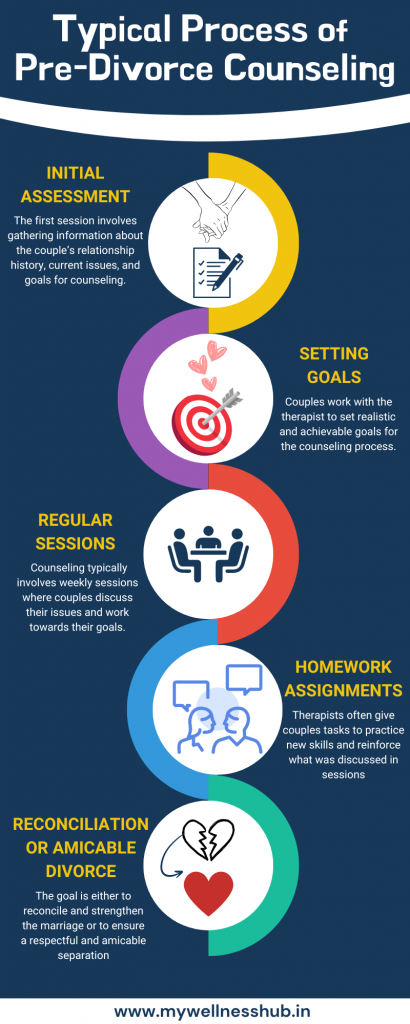
When considering steps to take before considering divorce counseling, it’s helpful to understand what the process typically involves. Knowing what to expect can make the idea of counseling less daunting and more accessible.
The Typical Process of Marriage Counseling Sessions
Marriage counseling usually follows a structured process designed to help couples navigate their issues and find the best path forward. Here’s a general outline of what you can expect:
- Initial Assessment: The first session is often an assessment where the counselor gathers information about the couple’s relationship history, the current issues they are facing, and their goals for counseling. This session sets the foundation for future work.
- Setting Goals: After the initial assessment, the counselor works with the couple to set realistic and achievable goals. These goals guide the therapy process and ensure that both partners are on the same page.
- Regular Sessions: Counseling typically involves regular sessions, usually once a week. These sessions provide a consistent time and space for couples to work on their issues with the guidance of the counselor.
- Homework Assignments: To reinforce what is discussed during sessions, counselors often give couples homework assignments. These tasks are designed to help partners practice new communication skills, reflect on their relationship, and implement changes in their daily lives.
Methods and Techniques Used by Counselors
Counselors use a variety of methods and techniques to address marital issues. Some of the most common include:
- Cognitive-Behavioral Therapy (CBT): CBT helps couples identify and change negative thought patterns and behaviors that contribute to their problems. By focusing on the present, couples learn practical skills to improve their relationship.
- Emotionally Focused Therapy (EFT): EFT aims to improve the emotional bond between partners by addressing their attachment needs and fears. This method helps couples create a more secure and connected relationship.
- Gottman Method: Based on extensive research, the Gottman Method focuses on building positive interactions and managing conflict. Techniques include enhancing love maps, nurturing fondness and admiration, and turning towards each other instead of away.
- Communication Skills Training: Many counselors spend significant time teaching couples how to communicate effectively. This includes active listening, using “I” statements, and learning to express needs and desires constructively.
- Conflict Resolution Strategies: Counselors help couples develop strategies for resolving conflicts in a healthy manner. This may involve techniques such as taking breaks during heated discussions and focusing on finding mutually agreeable solutions.
Outcomes of Pre-Divorce Counseling
The outcome of pre-divorce counseling can vary depending on the couple’s specific situation. While the goal is often to save the marriage, sometimes the best outcome is a peaceful and amicable divorce. Here’s how counseling can help in both scenarios:
- Reconciliation: For many couples, counseling helps them rediscover their connection, improve communication, and resolve longstanding issues. This can lead to a stronger, more resilient marriage.
- Amicable Divorce: If reconciliation is not possible, counseling can still be incredibly beneficial. It provides a structured environment to discuss the terms of the divorce, ensure that both partners’ needs are considered, and plan for effective co-parenting. This can make the divorce process less adversarial and more cooperative.
Overcoming Resistance to Counseling
When considering relationship counseling before divorce, it’s not uncommon for one partner to resist the idea. Understanding the reasons behind this resistance and finding ways to address it can be key to moving forward together.
Common Reasons for Resistance to Counseling
There are several reasons why one partner might be hesitant or outright resistant to attending counseling. Here are some of the most common:
- Fear of Blame: Some individuals worry that counseling will turn into a blame game where they will be held responsible for all the issues in the relationship.
- Stigma: There can be a stigma attached to seeking help, with some people feeling that needing counseling is a sign of failure.
- Denial: A partner might not believe there is a problem or might be in denial about the severity of the issues.
- Fear of Change: Counseling often brings about change, and this can be intimidating. The idea of confronting and addressing deep-seated issues can be overwhelming.
- Privacy Concerns: Some individuals are uncomfortable sharing personal details with a stranger, fearing a loss of privacy.
Encouraging a Reluctant Partner to Attend Counseling
Addressing these concerns with empathy and understanding can help encourage a reluctant partner to give counseling a try. Here are some tips:
- Communicate Openly: Explain why you believe counseling is important and how it can benefit both of you. Use “I” statements to express your feelings without blaming your partner. For example, “I feel that counseling could help us understand each other better.”
- Highlight the Benefits: Emphasize the positive outcomes of counseling, such as improved communication, a better understanding of each other, and a healthier relationship overall. Mention that counseling for troubled marriages has helped many couples.
- Address Fears: If your partner is worried about being blamed, reassure them that counseling is a safe space for both partners and not about pointing fingers. It’s about working together to find solutions.
- Normalize the Process: Help reduce the stigma by normalizing the idea of seeking help. You can mention that many couples go through relationship counseling before divorce to either save their marriage or part ways amicably.
- Offer to Find a Suitable Counselor: Sometimes, the idea of finding a counselor can be daunting. Offer to help find a counselor that both of you feel comfortable with.
- Propose a Trial Period: Suggest attending a few sessions as a trial. This can help your partner feel less committed and more willing to give it a try.
- Seek Support: Sometimes, having support from a trusted friend or family member can encourage a partner to attend counseling. They might feel more at ease knowing others support the idea.
Making the Decision: Counseling or Divorce?
Deciding whether to pursue counseling or proceed with divorce is a significant decision that requires careful consideration. What to expect from pre-divorce counseling? Let’s summarize the key points discussed and encourage you to consider counseling as a valuable step before making a final decision.
Summary of Key Points
- Understanding Marriage Counseling Before Divorce: We explored how marriage counseling before divorce provides a safe and structured environment for couples to address their issues. It helps in understanding whether the marriage can be saved or if divorce is the best option.
- Why Seek Marriage Counseling Before Divorce?: Addressing marital issues with a professional can bring clarity and improve communication. Counseling helps couples make informed decisions about their relationship and understand the benefits of pre-divorce marriage therapy.
- Key Benefits of Marriage Counseling Before Divorce:
- Clarifying the Need for Divorce: Counseling can help couples decide if divorce is necessary and sometimes reveals that separation is the best path forward.
- Improving Communication and Understanding: Enhanced communication skills can resolve conflicts and prevent misunderstandings, contributing to a healthier relationship.
- Providing a Better Future for Children: A stable and communicative family environment positively impacts children, even if divorce occurs.
- Financial and Emotional Benefits: Counseling is cost-effective compared to divorce expenses and provides emotional support, reducing stress and anxiety.
- Personal Growth and Happiness: Therapy fosters personal insights and growth, helping individuals rediscover happiness and fun in their relationship.
- What to Expect from Pre-Divorce Counseling: The typical process of counseling sessions includes initial assessments, setting goals, regular sessions, and practical techniques for resolving marital issues. Sometimes, the outcome is a peaceful and amicable divorce.
- Overcoming Resistance to Counseling: Addressing common reasons for resistance and encouraging a reluctant partner to attend counseling can open the door to improved communication and a healthier relationship.
Conclusion
In conclusion, before considering divorce, explore the transformative potential of marriage counseling. It not only offers a structured environment to address grievances and forge solutions but also enriches your emotional well-being and the health of your relationship. Whether it’s enhancing communication, resolving conflicts, or navigating the intricacies of separation amicably, counseling provides essential tools for decision-making. At Wellness Hub, our seasoned therapists are committed to guiding you through these challenges. We invite you to visit our Marriage Counseling Services page to discover how counseling could be the crucial step towards a rejuvenated future for your relationship.
Frequently Asked Questions:
1. What is marriage counseling before divorce?
Marriage counseling before divorce is a form of therapy where couples work with a professional therapist to address and resolve their relationship issues. The goal is to gain clarity on whether to continue working on the marriage or to proceed with a divorce.
2. Why should we consider marriage counseling before filing for divorce?
Marriage counseling can help you understand your relationship better, improve communication, and resolve conflicts. It provides a safe space to explore your issues and can lead to either reconciliation or a more amicable separation if divorce is the best option.
3. Can marriage counseling save a troubled marriage?
Yes, marriage counseling can help save a troubled marriage by addressing underlying issues, improving communication, and providing tools for conflict resolution. However, its success depends on the willingness of both partners to engage in the process.
4. How long does pre-divorce marriage counseling typically take?
The duration of pre-divorce marriage counseling varies depending on the complexity of the issues and the couple’s commitment. It can range from a few sessions to several months of regular meetings.
5. What can we expect during marriage counseling sessions?
During marriage counseling sessions, you can expect an initial assessment, goal setting, regular sessions to address issues, and homework assignments to practice new skills. Counselors use various techniques to help improve communication and resolve conflicts.
6. Is couples therapy worth it before deciding on divorce?
Yes, couples therapy is worth it before deciding on divorce. It helps clarify your feelings, improves communication, and can either save the marriage or ensure a more amicable separation if divorce is the final decision.
7. How can we overcome resistance to marriage counseling?
To overcome resistance to marriage counseling, communicate openly with your partner about the benefits, address their concerns, suggest a trial period, and offer to find a suitable counselor together. Normalizing the process and seeking support from trusted friends or family can a
8. What are the financial benefits of marriage counseling compared to divorce?
Marriage counseling is generally more cost-effective than divorce. It can help resolve issues and prevent expensive legal fees, court costs, and the financial strain of maintaining separate hou
9. How does marriage counseling benefit children in troubled marriages?
Marriage counseling can create a healthier family environment, improve parental communication, and reduce conflicts, which positively impacts children’s emotional and psychological well-being. It also helps parents develop effective co-parenting strategies if divorce occurs.
10. Where can we find professional marriage counseling services?
You can find professional marriage counseling services at Wellness Hub. Our experienced therapists provide personalized support to help you navigate your relationship challenges. Visit our Marriage Counseling Services page to learn more.
About the Author:
Prapoorna Mangalampalli
M.Sc., M.A., (Dual Masters in Psychology & English) – Counselor (6+ years of experience)
Prapoorna is a skilled counselor with dual Master’s degrees in Psychology and English. With more than six years of professional experience, she specializes in providing various types of counseling, including online Therapy , Marital , Relationship, child, family, and career counseling. Prapoorna is part of the Wellness Hub team, where she contributes significantly to their mission. She values a team-based approach and is committed to innovation, compassion, and the success of her clients. Her diverse educational background and extensive experience enable her to offer insightful and effective counseling services that positively impact individuals and families.
Book your Free Consultation Today
Parent/Caregiver Info:
Client’s Details:
* Error Message

